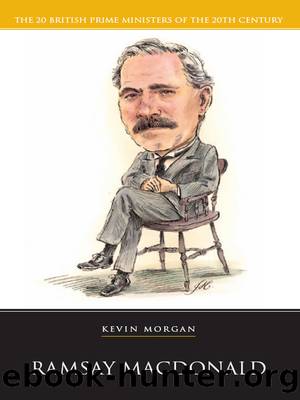Ramsay Macdonald by Kevin Morgan

Author:Kevin Morgan [Morgan, Kevin]
Language: eng
Format: epub
Tags: Biography & Autobiography, General, Historical, Presidents & Heads of State, History, Europe, Great Britain
ISBN: 9781904950615
Google: E0ubhRtZ13kC
Publisher: Haus Publishing
Published: 2006-11-15T00:22:39+00:00
As the head of a party government ⦠I should be regarded as a limpet in office.
MACDONALD
The roots of his predicament lay in the election that secured him the premiership. Baldwinâs Tories, though ready to support MacDonald, were eager to do battle with Labour. By the end of September 1931 MacDonald himself believed it necessary to seek a mandate from the country. His personal role in the election was crucial; except among Labour households his prestige was never higher, and even Conservative election addresses were twice as likely to mention him as Baldwin.3
On the other hand, the very scale of MacDonaldâs victory underlined his ultimate dispensability. In breaking with Labour, he had shown little concern to rally those within the party who might have shared his views. He did not even attend the meeting of the parliamentary party called to discuss his conduct. A desperate effort was made to run a National Labour slate independent of the Conservative Party, and 35 candidates were initially projected. In the event, only 20 actually stood, of whom the 13 allowed a free run by the Tories were successful. All seven denied it were not. The Liberals, while more than maintaining their parliamentary strength, were also disproportionately dependent on âLiberal Nationalâ candidates depending on similar arrangements.
The underlying meaning of the 1931 election was thus of Britainâs return to a two-party model of electoral competition. âNationalâ in reality signified anti-socialist, in the manner of the Tory-Liberal pacts that were common in local elections. In some 470 seats, government candidates faced either no opposition or a straight fight against Labour, occasionally enlivened by a fringe candidate. The result for Labour was calamitous. On one side of the house, the denuded opposition benches contained just 52 Labour MPs, even including unendorsed candidates and the ILP. Spilling over opposite was the phalanx of the ânationâ, eleven times as strong, and with Liberal and Labour nationals surrounded by the highest number of Tories (also 470) ever elected. Conservatives often comported themselves as if they held the title to the nation; the National Governments of the 1930s were just the most brazen expression of that claim. Labour thus experienced its first national electoral setback since its formation. Its share of the vote, on the other hand, was almost identical with that on which MacDonald had formed his first government in 1924.4 Labour in defeat stood as the only significant alternative to the Tories.
For MacDonald it was a strange fulfilment. In his early parliamentary career he had set out his stall against coalition government and rebuffed approaches to join a Liberal Cabinet. I like to think, he told the Commons in 1910, that a day will come when we shall have two great parties â a party standing for the status quo and a party standing for progress on well-defined lines â standing for the opposition of certain principles which when they are applied to our social life will change fundamentally that social life.5 Now the two parties clearly existed, and MacDonald was at the head of the wrong one.
Download
This site does not store any files on its server. We only index and link to content provided by other sites. Please contact the content providers to delete copyright contents if any and email us, we'll remove relevant links or contents immediately.
| U.K. Prime Ministers | U.S. Presidents |
Waking Up in Heaven: A True Story of Brokenness, Heaven, and Life Again by McVea Crystal & Tresniowski Alex(37808)
Empire of the Sikhs by Patwant Singh(23084)
We're Going to Need More Wine by Gabrielle Union(19046)
Hans Sturm: A Soldier's Odyssey on the Eastern Front by Gordon Williamson(18590)
Leonardo da Vinci by Walter Isaacson(13336)
The Radium Girls by Kate Moore(12028)
Tools of Titans by Timothy Ferriss(8393)
Educated by Tara Westover(8054)
How to Be a Bawse: A Guide to Conquering Life by Lilly Singh(7486)
Permanent Record by Edward Snowden(5846)
The Last Black Unicorn by Tiffany Haddish(5635)
The Rise and Fall of Senator Joe McCarthy by James Cross Giblin(5280)
Promise Me, Dad by Joe Biden(5153)
The Wind in My Hair by Masih Alinejad(5095)
A Higher Loyalty: Truth, Lies, and Leadership by James Comey(4961)
The Crown by Robert Lacey(4814)
The Iron Duke by The Iron Duke(4354)
Joan of Arc by Mary Gordon(4109)
Stalin by Stephen Kotkin(3965)
